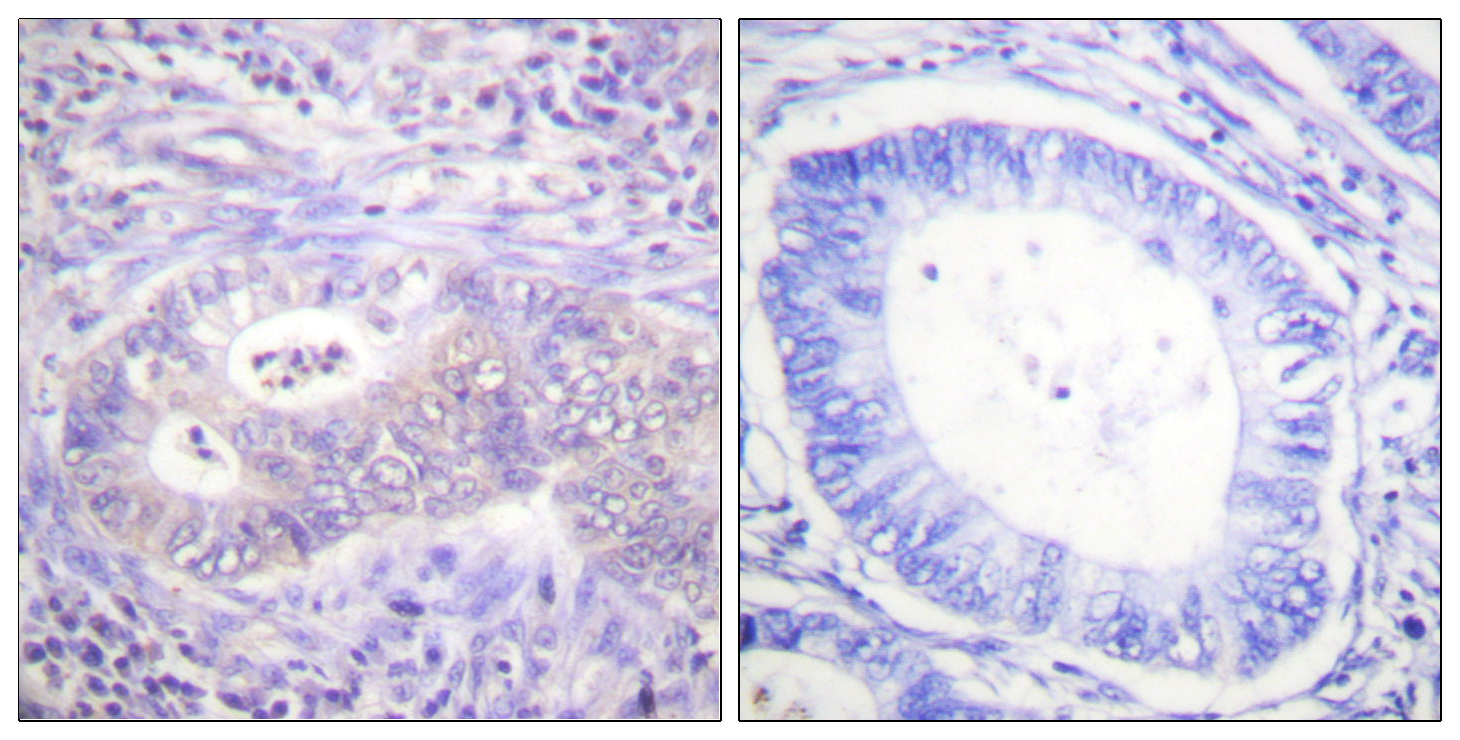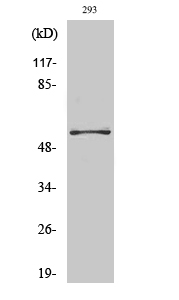PFK-2 car (phospho Ser483) Polyclonal Antibody
- Catalog No.:YP0711
- Applications:WB;IHC;IF;ELISA
- Reactivity:Human;Mouse;Rat
- Target:
- PFK-2 car
- Fields:
- >>Fructose and mannose metabolism;>>Metabolic pathways;>>AMPK signaling pathway;>>Thyroid hormone signaling pathway
- Gene Name:
- PFKFB2
- Protein Name:
- 6-phosphofructo-2-kinase/fructose-2,6-bisphosphatase 2
- Human Gene Id:
- 5208
- Human Swiss Prot No:
- O60825
- Mouse Gene Id:
- 18640
- Mouse Swiss Prot No:
- P70265
- Rat Gene Id:
- 24640
- Rat Swiss Prot No:
- Q9JJH5
- Immunogen:
- The antiserum was produced against synthesized peptide derived from human PFKFB2 around the phosphorylation site of Ser483. AA range:451-500
- Specificity:
- Phospho-PFK-2 car (S483) Polyclonal Antibody detects endogenous levels of PFK-2 car protein only when phosphorylated at S483.
- Formulation:
- Liquid in PBS containing 50% glycerol, 0.5% BSA and 0.02% sodium azide.
- Source:
- Polyclonal, Rabbit,IgG
- Dilution:
- WB 1:500 - 1:2000. IHC 1:100 - 1:300. ELISA: 1:40000.. IF 1:50-200
- Purification:
- The antibody was affinity-purified from rabbit antiserum by affinity-chromatography using epitope-specific immunogen.
- Concentration:
- 1 mg/ml
- Storage Stability:
- -15°C to -25°C/1 year(Do not lower than -25°C)
- Other Name:
- PFKFB2;6-phosphofructo-2-kinase/fructose-2;6-bisphosphatase 2;6PF-2-K/Fru-2,6-P2ase 2;PFK/FBPase 2;6PF-2-K/Fru-2,6-P2ase heart-type isozyme
- Observed Band(KD):
- 58kD
- Background:
- The protein encoded by this gene is involved in both the synthesis and degradation of fructose-2,6-bisphosphate, a regulatory molecule that controls glycolysis in eukaryotes. The encoded protein has a 6-phosphofructo-2-kinase activity that catalyzes the synthesis of fructose-2,6-bisphosphate, and a fructose-2,6-biphosphatase activity that catalyzes the degradation of fructose-2,6-bisphosphate. This protein regulates fructose-2,6-bisphosphate levels in the heart, while a related enzyme encoded by a different gene regulates fructose-2,6-bisphosphate levels in the liver and muscle. This enzyme functions as a homodimer. Two transcript variants encoding two different isoforms have been found for this gene. [provided by RefSeq, Jul 2008],
- Function:
- catalytic activity:ATP + D-fructose 6-phosphate = ADP + beta-D-fructose 2,6-bisphosphate.,catalytic activity:Beta-D-fructose 2,6-bisphosphate + H(2)O = D-fructose 6-phosphate + phosphate.,enzyme regulation:Phosphorylation results in the activation of the kinase activity.,function:Synthesis and degradation of fructose 2,6-bisphosphate.,similarity:In the C-terminal section; belongs to the phosphoglycerate mutase family.,subunit:Homodimer.,tissue specificity:Heart.,
- Subcellular Location:
- cytosol,
- Expression:
- Heart.
- June 19-2018
- WESTERN IMMUNOBLOTTING PROTOCOL
- June 19-2018
- IMMUNOHISTOCHEMISTRY-PARAFFIN PROTOCOL
- June 19-2018
- IMMUNOFLUORESCENCE PROTOCOL
- September 08-2020
- FLOW-CYTOMEYRT-PROTOCOL
- May 20-2022
- Cell-Based ELISA│解您多样本WB检测之困扰
- July 13-2018
- CELL-BASED-ELISA-PROTOCOL-FOR-ACETYL-PROTEIN
- July 13-2018
- CELL-BASED-ELISA-PROTOCOL-FOR-PHOSPHO-PROTEIN
- July 13-2018
- Antibody-FAQs
- Products Images

- Western Blot analysis of various cells using Phospho-PFK-2 car (S483) Polyclonal Antibody diluted at 1:1000
.jpg)
- Western Blot analysis of Hela cells using Phospho-PFK-2 car (S483) Polyclonal Antibody diluted at 1:1000

- Enzyme-Linked Immunosorbent Assay (Phospho-ELISA) for Immunogen Phosphopeptide (Phospho-left) and Non-Phosphopeptide (Phospho-right), using PFKFB2 (Phospho-Ser483) Antibody

- Immunohistochemistry analysis of paraffin-embedded human colon carcinoma, using PFKFB2 (Phospho-Ser483) Antibody. The picture on the right is blocked with the phospho peptide.

